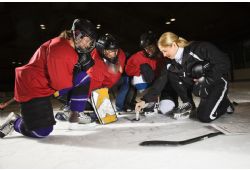An athlete can thrive in more ways
than one with the right coach, but what exactly makes a great coach? Here are a
few things this long-time coach believes makes all the difference for young
athletes.
“A good coach wears many hats.
Important ingredients include leadership skills, patience, innovation,
excellent communications skills and a good sense of humour,” says Terry
Nowostawsky, who has coached youth in hockey, basketball and cross-country
skiing for years. “A coach must understand players have different skill sets
and attributes and should focus on these skills. A coach must build confidence
in weaker players by creating tasks and drills that players will complete
successfully. Once they have succeeded, their confidence will grow and they
will want to learn new tasks.”
Nowostawsky says everyone
contributes to team spirit, including athletes and their families. He believes
if parents and coaches work together to create a positive and encouraging environment for young athletes,
children learn so much more. “Through sports, children learn physical
awareness, decision-making skills and social skills. Participating in sports
builds self-esteem, an important part of growing up,” Nowostawsky explains.
Team players must commit to each
other and their coach. Players must understand the importance of their role
within a team, which helps them comprehend the importance of succeeding in
sports and school.
Karen Lukanovich, former Olympian
and member of the National Kayak Team, has
coached athletic youth for years.
She says her experience with coaching athletes and supporting their goals
requires an investment in best coaching practices and processes. Preparation of
yearly programs and practice planning integrate core components that must be
well planned, communicated effectively, and processes shared with and committed
to by athletes. Plans and programs must provide performance measurements for
ongoing evaluation, give critical feedback and be adaptable.
“I have discovered that best planning and
processes are not enough in the pursuit of excellence,” Lukanovich says. “The
art of coaching – whether as a business leader, coach or teacher – are important soft skills required to build
relationships, create welcoming environments, encourage critical thinking,
problem solving, and self-evaluation skills.”
Lukanovich was fortunate to have some wonderful business mentors,
coaches and teachers who inspired her with their leadership, motivation and
support to help her achieve and exceed her goals as an athlete and business
leader.
Shelley Coolidge, ChPC, EPA, Manager,
Professional Coaching Services from
Coaching
Association of Canada offers key suggestions for parents who are contemplating
signing up with a sports coach for their children;
- Make sure they implement the “Rule of Two”; two screened adults working with children versus a one-on-one environment
- Ensure background screening; two references, plus police record check
- Find out if they have completed Respect and Ethics Training
For more information for parents, visit coach.ca.
Each coach may teach differently, but a great coach can challenge children to be better people. Most coaches believe coaching has enriched their own life and has provided an opportunity to give back what other coaches have taught them. The key is to meet the challenge and to have fun.

 In The Latest Issue:
In The Latest Issue:


 BY:
BY: 

Tweet
Share